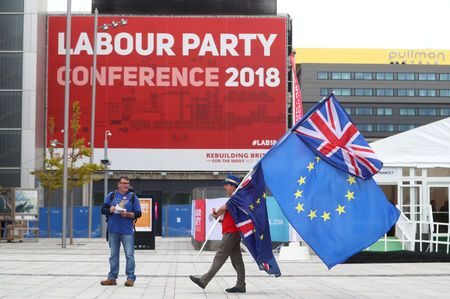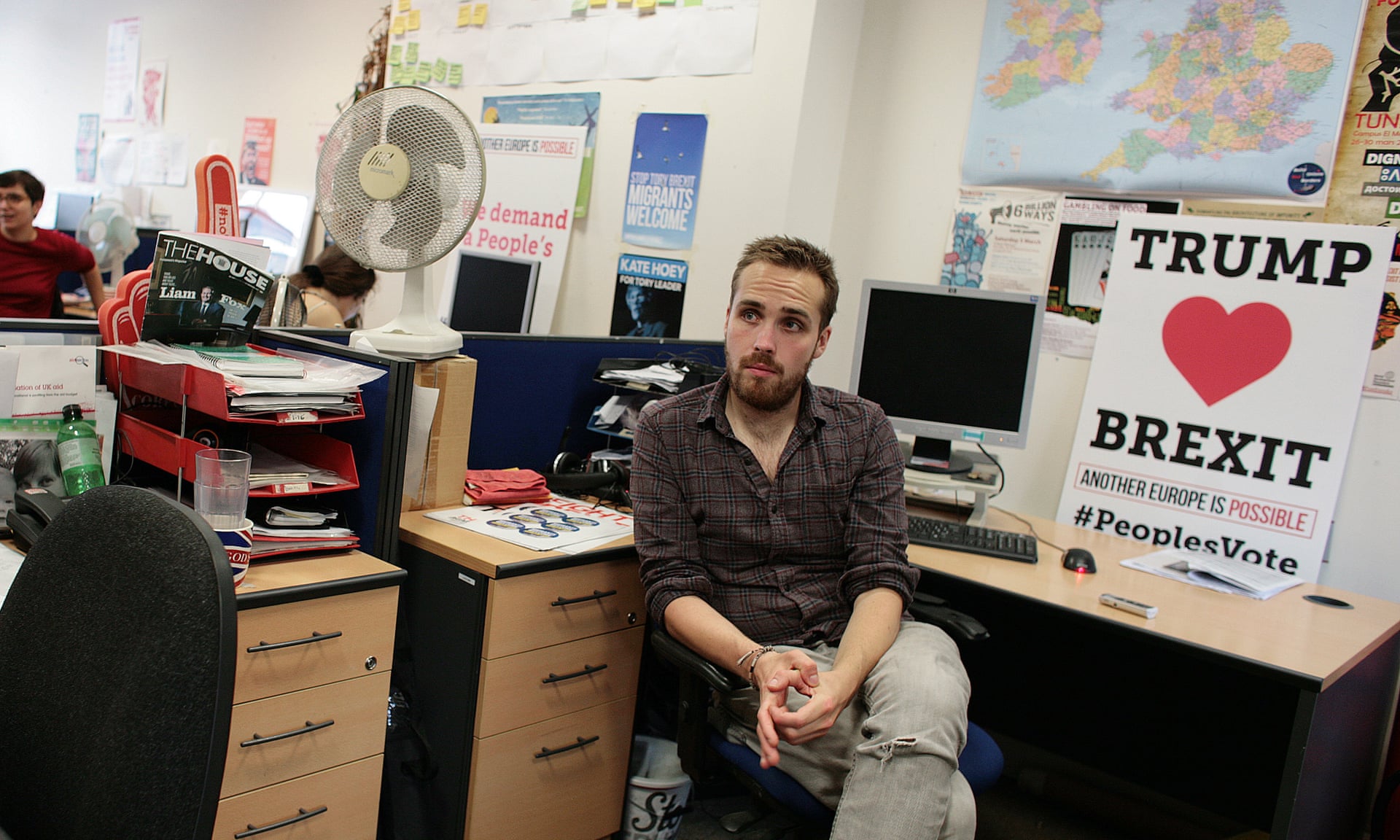The witch-hunt against Jeremy Corbyn and the left is still in full swing – and spreading across society, reports Carla Roberts
Who would have thought we would ever be relieved to read an attack on Jeremy Corbyn? We are talking about the recent uproar over his “scruffy” attire on Remembrance Sunday – where he, would you believe it, wore a jacket with a hood! This kind of low-level bad publicity looks as quaint as the “donkey jacket” that then Labour leader Michael Foot was wearing in 1981 (and which turned out to be a £250 coat from Harrods). There are even rumours that Corbyn wore it on purpose – perhaps to get some kind of short reprieve from the far more serious, political campaign against him and the Labour left.
Alas, it did not last long. Just in the last couple of weeks, the witch-hunt against Corbyn and the left has been ratcheted up:
* Scotland Yard launched a well-publicised investigation against some members of the Labour Party for alleged anti-Semitic comments.
* Chris Williamson MP was de-invited by Sheffield Labour Students after complaints by the Jewish Student Society that he was “encouraging a culture of anti-Semitism”.
* Most bourgeois newspapers breathlessly reported that a Labour Party branch in Stockton-on-Tees “voted down a motion on the Pittsburgh synagogue attack”, because “there was too much focus on ‘anti-Semitism this, anti-Semitism that’”. Far from being voted down by the left (which all the articles imply), this was actually opposed by the ‘moderates’ – perhaps because they resented the idea in the same motion that there was a need for ‘anti-Semitism training’, which the mover had previously suggested should be delivered by the Zionist Jewish Labour Movement. Incredibly, the proposer of the motion thought it was a good idea to publicise his branch’s non-adoption far and wide. Of course, the right jumped on it and predictably used it to batter Corbyn some more. The technical term here is ‘useful idiot’.
* The Labour Party’s national constitutional committee has just expelled Mike Sivier (see below) – apparently explaining that their lack of evidence against him were “technicalities” and that “it’s about the impact in the public domain” and “about perception … It’s about how this is perceived by the Jewish community.”
* Scottish Labour Party member Peter Gregson is under investigation for producing a petition that states: “Israel is a racist endeavour.”
* A council worker in Dudley was suspended from work for publishing the same phrase online, while advertising a lobby of Dudley Labour MP Ian Austin’s surgery.
Of course, these are just the cases, allegations and ‘scandals’ that make it into the public. We know of plenty more cases of Labour members currently being investigated on the most absurd allegations (and not just to do with anti-Semitism).
Clearly, the witch-hunt against Jeremy Corbyn and the Labour left shows no sign of slowing down – in fact, it is spreading into all areas of society and, perhaps most worryingly, the workplace. Labour Party Marxists secretary Stan Keable remains sacked, having been secretly filmed by a journalist at the ‘Enough is enough’ demonstration in March 2018, when he stated that the Zionist movement had collaborated with the Nazi regime – a historically inconvenient truth. We know of at least one other similar case. There will be more, but – not surprisingly – not everybody accused of such ‘crimes’ will want their name dragged through the mud in public and many choose to keep quiet.
This is perhaps the most worrying aspect of the witch-hunt: the silencing of debate on the left and the self-censorship.
Sheffield
Take the events in Sheffield: Chris Williamson MP had been invited by Sheffield Labour Students (SLS) to speak on ‘Why we need an anti-war government’. But they got cold feet when the local Jewish Society (JSoc) complained publicly that he should be banned from campus, because he “repeatedly defended, and shared platforms with, anti-Semites expelled from the Labour Party” (they mention Tony Greenstein, Jackie Walker and Ken Livingstone – the latter two have of course not been expelled from the party). Apparently, according to JSoc, comrade Williamson is “encouraging a culture of anti-Semitism” and his invitation was “a betrayal of Jewish students in Sheffield”.
At first, the SLS committee – which has a clear pro-Corbyn majority – confirmed that the meeting would go ahead, though its affirmation that Williamson “has never been and is not accused of anti-Semitism through disciplinary procedures within the Labour Party” probably sounded sheepish enough to further encourage the right.
And, yes, all hell broke loose: JSoc secretary Gabe Milne publicly resigned from the Labour Party, stating that this was the “final straw”. Needless to say, he has never been a fan of Jeremy Corbyn, to put it mildly. He seems to be a member of the Jewish Labour Movement and has re-tweeted its demand that Chris Williamson should have the Labour whip withdrawn.
Labour Students BAME (run by the right) quickly jumped on the bandwagon, stating how “disappointed” they were over the planned event, “which can only further damage Labour’s relationship with British Jews”. Other rightwingers piled in … and then Labour Students committee saw its first resignation: Caelan Reid – who is, incredibly, also a member of the Momentum Sheffield leadership – stated that he had argued the committee should have followed JSoc’s “quite reasonably request” and that he “had hoped that the committee would listen to and accommodate the requests of a minority group”.
When Labour Students committee met again on November 2, they had been spooked enough to overturn their previous decision. In a jaw-dropping statement, they first wrote that the event was to be “indefinitely postponed” and then clarified that they will revisit the decision after “the current Scotland Yard police investigations into allegations of anti-Semitism within the Labour Party has been resolved”. They continue:
Although Chris Williamson MP is not personally implicated by these allegations, Sheffield Labour Students believes that due to the nature of the investigation calling into question the efficiency of the disciplinary procedures within the party, and the current climate within the wider movement, we do not feel that the event should take place at this moment in time. Another vote will be held after the conclusion of the investigation to determine if the event should take place.
Needless to say, Scotland Yard is unlikely to ever “resolve” this investigation. For a start, no fewer than 45 different allegations were passed to the police. After “assessing” the charges for over two months, Metropolitan police commissioner Cressida Dick announced on November 2 that “some” of the material is now being investigated, “because it appears there may have been a crime committed”. Even the widely quoted former Met officer, Mak Chishty, managed to identify only four cases of the 45 that could be described as “potential race hate crimes” (my emphasis).
Of course, this highly political police investigation was always a cop-out, conveniently used by the remaining members of the SLS committee – as they quite rightly state, it has nothing to do with either Chris Williamson or holding a meeting on ‘Why we need an anti-war government’.
During this debacle, a total of seven members of the SLS committee resigned their position (most of them more ‘moderate’ than left, as it turns out). Credit must go to Sheffield Labour Left, which quickly took over the hosting of the event and organised a petition against the decision, which has been signed by almost 90 Sheffield Labour Party members. After Jeremy Corbyn himself, comrade Williamson must by now surely be most vilified politician in Britain – and not because he “encourages a culture of anti-Semitism”. He is in fact pretty much the only MP who has taken a principled stand on the ongoing witch-hunt that seeks to label opposition to Zionism “anti-Semitic”. A sad state of affairs indeed.
Mike Sivier
The case against Mike Sivier is intriguing, because he seems absolutely right when he claims that there is precious little evidence that supports his expulsion from the party. Even those claiming that Sivier is clearly anti-Semitic and have written long articles about his case cannot actually produce any real proof. In a piece entitled The ballad of Mike Sivier, the hostile author, Marlon Solomon, draws a long list of examples of Sivier’s ‘crimes’ – which basically amount to the fact that he was defending various people falsely accused of anti-Semitism.
We read, for example, that he supported Ken Livingstone’s reference to the 1933 Ha’avara agreement between the Nazi regime and the Zionist Federation of Germany (which paved the way for the migration of around 60,000 German Jews to Palestine), sided with Jackie Walker and Tony Greenstein and recommended that people should watch Al Jazeera’s excellent programme The lobby, which exposes how the pro-Israel lobby has helped to manufacture the anti-Semitism ‘scandal’ in the Labour Party. And that is it.
Solomon laments that (at the time of writing in January 2018) “none of the above is now considered sufficient to expel someone from the Labour Party”. Quite right – it should not be. In August, Sivier won a complaint taken to the Independent Press Standards Organisation against the Jewish Chronicle, which had falsely claimed he was a “holocaust denier”. Interestingly, back in February 2018, Labour’s national executive committee discussed Sivier’s case and voted 12-10 to lift his suspension dating back to May 2017 – under the condition that he attend so-called “anti-Semitism training”, conducted by the pro-Zionist Jewish Labour Movement. To his credit, he refused, insisting on his innocence. The NEC, clearly at a loss, thought it best to refer this case to the national constitutional committee.
He had no chance in front of this committee, which is still dominated by the right and will continue to be so, even after its expansion from 11 to 25 members, agreed at Labour Party conference this year. While the six candidates backed by Momentum and the Campaign for Labour Party Democracy will probably win, they will still be in a minority – and it remains to be seen how ‘leftwing’ these six really are, in any case: Sadly, Stephen Marks of Jewish Voice for Labour is the only one who has come out against the witch-hunt. In any case, the NCC, still chaired by rightwing witch-hunter general Maggie Cousins, decided on November 13 to expel Mike Sivier – but only for 18 months. And without providing any proof of Sivier’s alleged anti-Semitism. As he writes on his blog, his requests to produce actual evidence were rebutted with “No comment”; “We’ve not provided evidence – it’s about the impact in the public domain”; and “This is about perception … It’s about how this is perceived by the Jewish community.”
In other words, he has been expelled because his refusal to receive pro-Zionist training by the JLM makes the Labour Party look bad! This expulsion is clearly a travesty and should immediately be overturned by the NEC.
Similarly ridiculous is the case of Edinburgh Labour Party member Peter Gregson, who is currently “under investigation”. We will not be surprised if Gregson is also either told to undergo the JLM’s pro-Zionism training and/or referred to the NCC. The NEC’s dispute panel, meeting on November 20, will decide his fate (and that of a large number of other cases, presumably including the absurd allegation against Lee Rock, who stands accused of having argued “in favour of masturbation at the workplace” (!) in a Facebook discussion with radical feminists in 2015, over 15 months before he joined the Labour Party. We could make some guesses as to the kind of ‘training’ he might be offered, but maybe not).
Firstly, we should say it is to be welcomed that there have been some positive changes to the disciplinary process introduced by the new general secretary, Jennie Formby. The automatic suspensions doled out so liberally under her predecessor, Iain McNicol, seem to have stopped altogether. That is hugely important, because it allows an accused member – in theory – to retain their full membership rights. As it turns out, this is not always the case and we hear of examples where members who are merely “under investigation” have been blocked from standing for various positions, because the mere fact of the investigation against them could bring “the party into disrepute”. Full circular logic there.
Right answer
Judging by the examples of recent investigations we have seen, the accused usually receives a number of leading questions they have to answer to each piece of ‘evidence’ (usually a Facebook post or Tweet), along the lines of: “Do you accept that some people might find this offensive?” The right answer is almost always ‘yes’, naturally. And the questions are formulated in such a way as to coax the accused to apologise and, crucially, to promise never to do it again. In many such cases, the investigations then end in a rather patronising “official warning”, which will be “kept on file”.
Clearly, this method encapsulates the opposite of the culture of open debate and exchange of ideas that Marxists strive for. It is designed to shut people up. This is not just undemocratic: it is also dangerous. Rather than politically challenging wrong ideas and prejudice and thereby changing somebody’s viewpoint, this method encourages people to bottle ideas up and let them fester.
Still, it is good that at least formally the disciplinary process now seems to acknowledge the principle of ‘innocent until proven guilty’. However, the actual reasons why investigations are launched against somebody have been expanded massively. This is particularly true since the NEC’s adoption of the International Holocaust Remembrance Alliance ‘working definition’ of anti-Semitism, together with all 11 examples. Only the most naive or wilfully ignorant could really have believed that the IHRA document would bring the ongoing witch-hunt against Jeremy Corbyn and the Labour left to an end. Quite the opposite: it has been used by the right to increase and widen the attacks.
Peter Gregson is a perfect case in point. Just after the NEC’s collapse over the IHRA document, he produced a petition that boldly states: “the existence of Israel is a racist endeavour”. This refers to the most disputed of the 11 examples – and the one that Jeremy Corbyn tried to ‘neutralise’ with his unsuccessful amendment to the NEC. The petition has been signed by more than 700 people who claim to be “Labour Party members”. So far, only Gregson seems to have been charged over it. He has also been suspended by his union, the GMB – a move that he claims was orchestrated by outgoing NEC member Rhea Wolfson, a member of the JLM. We would not be surprised if that was the case.
Of particular interest is the reaction of Momentum owner and Labour NEC member Jon Lansman, who lost his rag when Gregson emailed him for the umpteenth time. He admitted that “declaring Israel to be a racist endeavour and challenging the NEC to expel him alongside others who signed a petition he launched may not be anti-Semitic …” But he continued: “… it is a deliberately provocative act, which is most certainly prejudicial to the interests of the party and I therefore urge the general secretary to take the appropriate action against you.”
Labour Against the Witchhunt quite rightly condemns Lansman’s intervention: “‘Provocative’ acts are the stuff of political debate. Lansman is effectively calling for the silencing of support for the Palestinian struggle against Zionism and Israel’s apartheid.” LAW, while defending Gregson against any disciplinary action, does not support the petition because it is, in parts, rather clumsily (and unfortunately) formulated.
Clearly, the NEC must halt the investigation into Peter Gregson immediately. It is exactly such unnecessary and politically charged disciplinary cases that bring the party into disrepute.

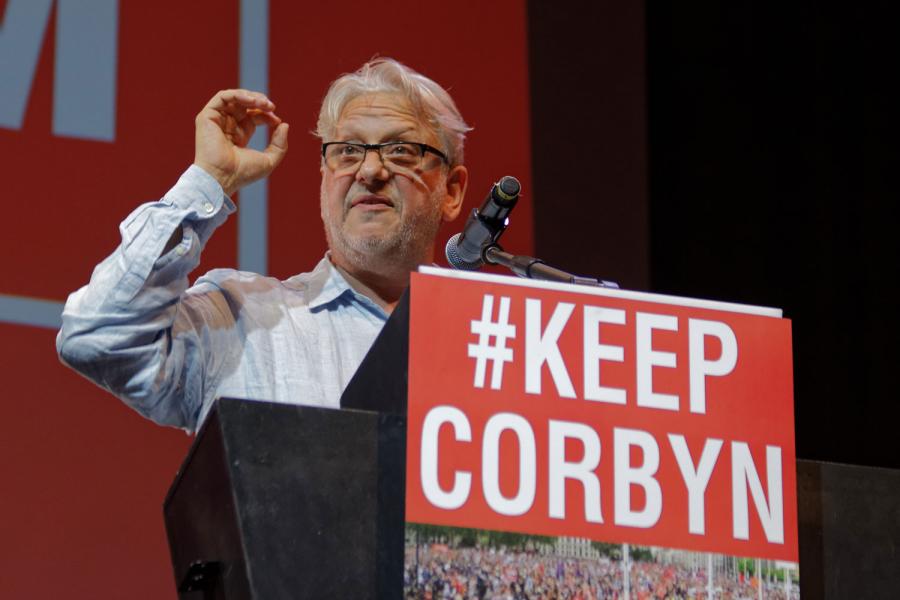

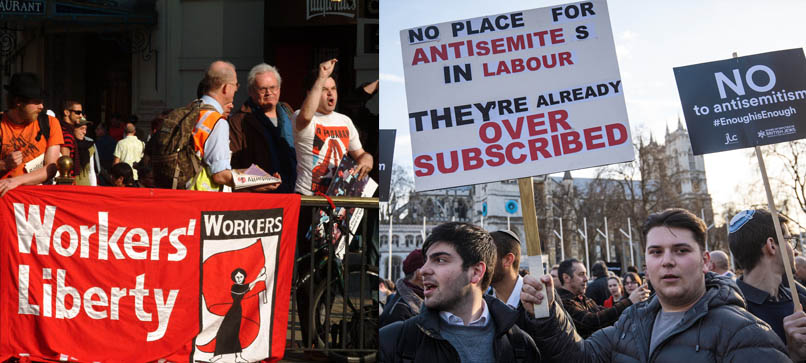
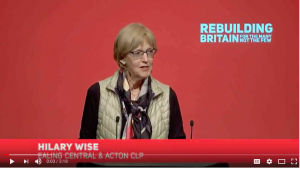 It is no surprise then that Wolfson chaired the session in a highly biased way. For example, she rudely interrupted Hilary Wise from Ealing and Acton Central CLP (pictured), who spoke passionately about the anti-Semitism smear campaign: “I never seen anything like the current campaign of slurs and accusations made against Jeremy Corbyn and the left in the party. I am afraid it is an orchestrated campaign and if you want to know how it works I urge you to watch ‘The lobby’ on Al Jazeera.”
It is no surprise then that Wolfson chaired the session in a highly biased way. For example, she rudely interrupted Hilary Wise from Ealing and Acton Central CLP (pictured), who spoke passionately about the anti-Semitism smear campaign: “I never seen anything like the current campaign of slurs and accusations made against Jeremy Corbyn and the left in the party. I am afraid it is an orchestrated campaign and if you want to know how it works I urge you to watch ‘The lobby’ on Al Jazeera.”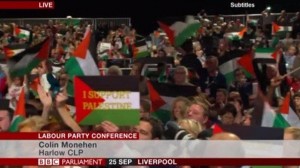 Flags everywhere: conference was in full solidarity with the Palestinian cause. The Labour membership clearly rejects the ‘Anti-Zionism equals anti-Semitism’ slurs and lies
Flags everywhere: conference was in full solidarity with the Palestinian cause. The Labour membership clearly rejects the ‘Anti-Zionism equals anti-Semitism’ slurs and lies 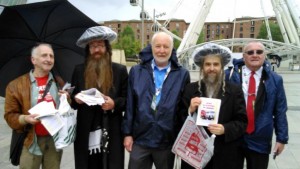 Members of Neturei Karta, an anti-Zionist, ultra-orthodox Jewish sect, handed out a good leaflet, ‘Jews in support of Jeremy’, at Liverpool conference. They condemn the foundation of a secular state of Israel as religiously blasphemous. The so-called Alliance for Workers’ Liberty prefers Zionist advocates of colonisation and ethnic cleansing
Members of Neturei Karta, an anti-Zionist, ultra-orthodox Jewish sect, handed out a good leaflet, ‘Jews in support of Jeremy’, at Liverpool conference. They condemn the foundation of a secular state of Israel as religiously blasphemous. The so-called Alliance for Workers’ Liberty prefers Zionist advocates of colonisation and ethnic cleansing 
